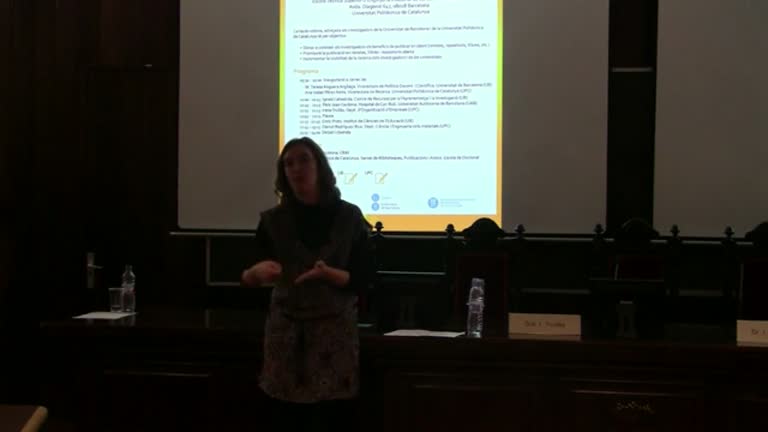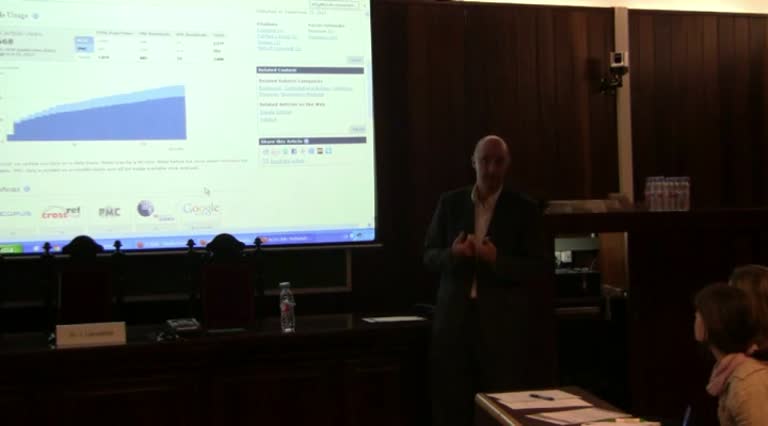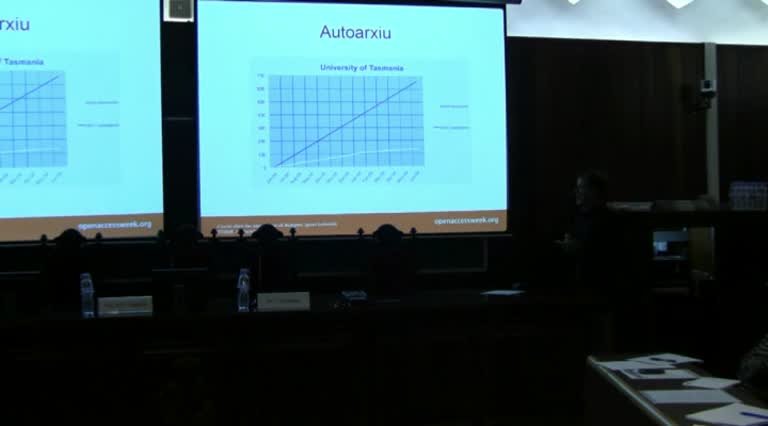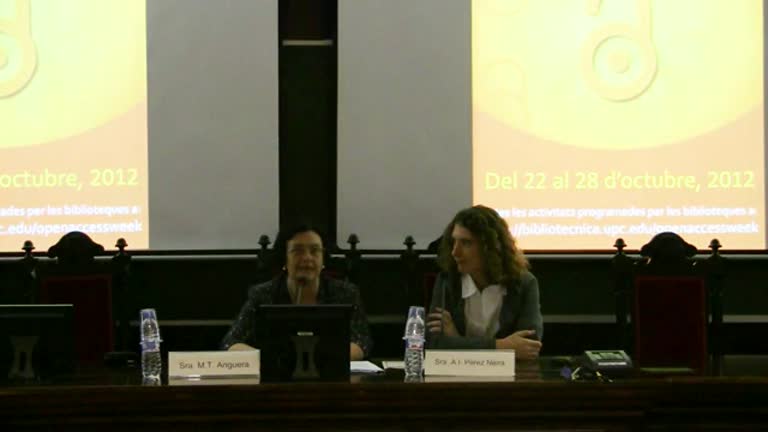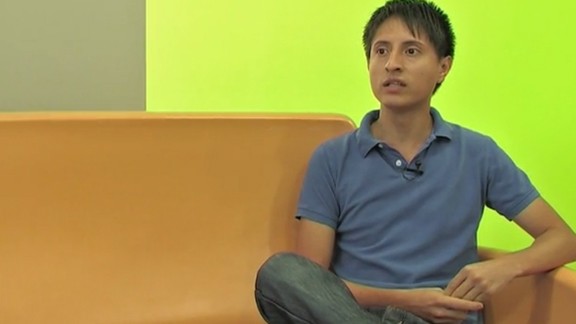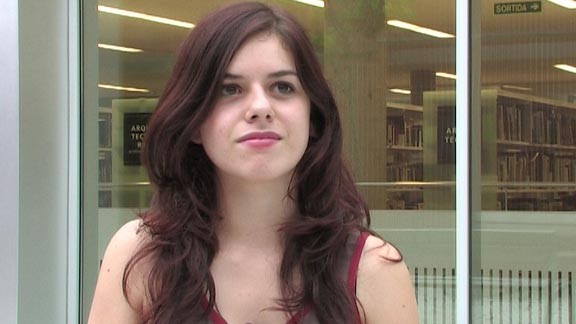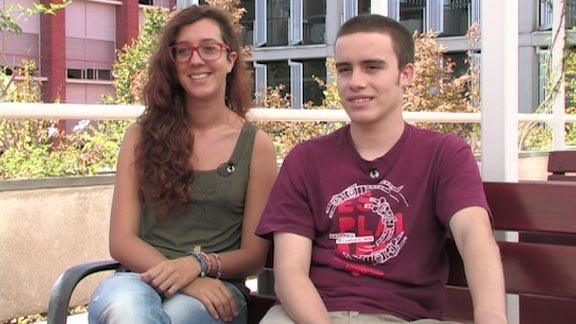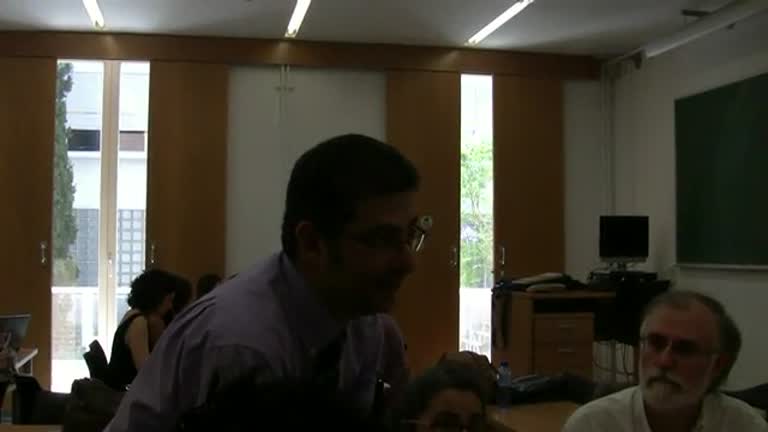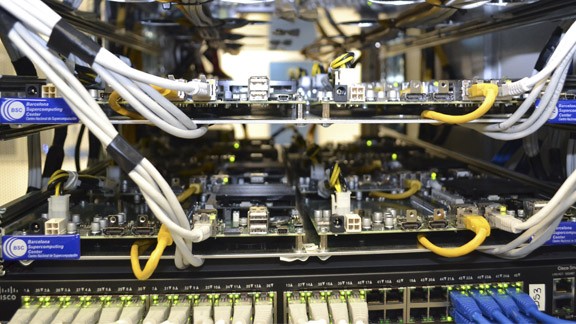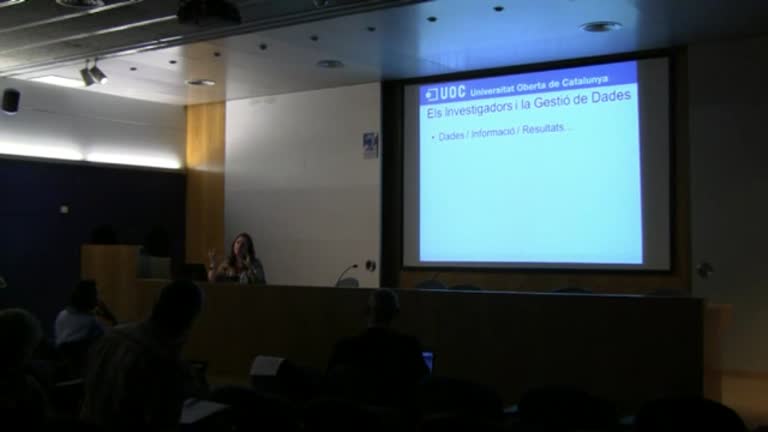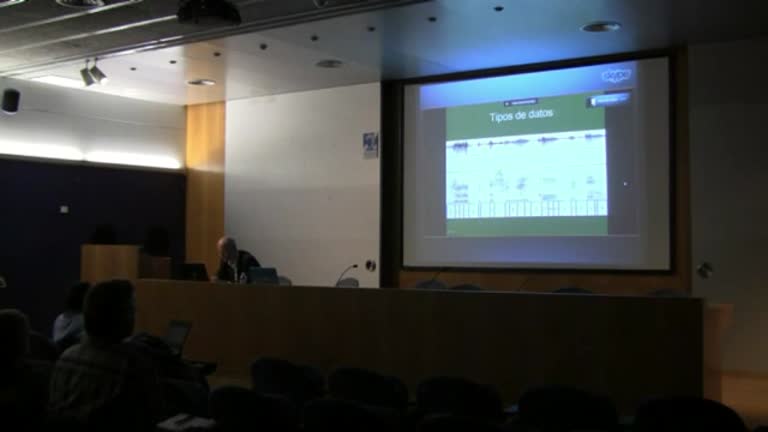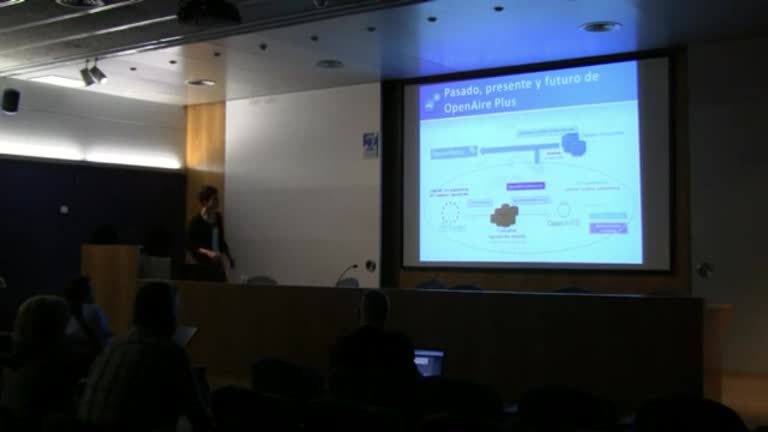Objectes multimèdia amb l’etiqueta: Serveis
Resultats de la cerca
3. Pere Joan Cardona. Hospital de Can Ruti. Universitat Autònoma de Barcelona (UAB)
Accés obert
23 d’oct. 2012
2. Ignasi Labastida. Centre de Recursos per a l'Aprenentatge i la Investigació (UB)
Accés obert
23 d’oct. 2012
Wheelchair, una cadira de rodes sostenible?
Accés obert
27 de set. 2012
El Premi UPC per a treballs de recerca de batxillerat i projectes de cicles formatius de grau superior. Arquitectura, Ciència i Tecnologia Sostenible ha arribat enguany a la seva tretzena edició. El Premi al millor treball de recerca de batxillerat s'ha atorgat a la proposta "Projecte d’un habitatge autosuficient i sostenible", d'Adrià Nicolàs i Laia Pérez, tutoritzat per Joan Ortega, de l'IES Alt Penedès, de Vilafranca del Penedès.
El jurat ha concedit el Premi Institut Català de les Dones al millor treball de batxillerat elaborat per una noia o grup de noies a "Santa Maria de Puigcerdà, 75 anys sense l’església. Aproximació històrica i arquitectònica", un treball de Judit Calveras, tutoritzat per Miquel Esteban, de l'IES Pere Borrell, de Puigcerdà. El Premi al millor projecte de cicles formatius de grau superior (CFGS) ha esta per al treball "Wheelchair", de Yanick Vera, amb Sergio Gómez com a tutor, de l'IES Llobregat, de l’Hospitalet de Llobregat. El projecte "Viabilitat d’un projecte solar en el Col·legi Sant Miquel", d'Enrique Grau i Ignasi Clavera, tutoritzat per Javier González, del Col·legi Sant Miquel, de Barcelona, s'ha proclamat finalista en aquesta edició del Premi.
L'acte de lliurament de guardons, que ha coincidit amb l'acte d'inauguració del curs acadèmic 2012-2013, ha estat presidit per Xavier Colom, vicerector de Docència i Estudiantat, i ha comptat amb la presència i les intervencions dels representants de les diferents entitats i institucions patrocinadores i col·laboradores del Premi: l'Institut Català de les Dones; el Col·legi d’Enginyers Tècnics Industrials de Barcelona; la Càtedra Unesco de Sostenibilitat de la UPC, i la Càtedra UPC Endesa Red de Valors Humans a l’Enginyeria - Victoriano Muñoz Homs. També ha comptat amb la presència de Gabriel Bugeda, vicerector de Qualitat i Responsabilitat Social.
El jurat ha concedit el Premi Institut Català de les Dones al millor treball de batxillerat elaborat per una noia o grup de noies a "Santa Maria de Puigcerdà, 75 anys sense l’església. Aproximació històrica i arquitectònica", un treball de Judit Calveras, tutoritzat per Miquel Esteban, de l'IES Pere Borrell, de Puigcerdà. El Premi al millor projecte de cicles formatius de grau superior (CFGS) ha esta per al treball "Wheelchair", de Yanick Vera, amb Sergio Gómez com a tutor, de l'IES Llobregat, de l’Hospitalet de Llobregat. El projecte "Viabilitat d’un projecte solar en el Col·legi Sant Miquel", d'Enrique Grau i Ignasi Clavera, tutoritzat per Javier González, del Col·legi Sant Miquel, de Barcelona, s'ha proclamat finalista en aquesta edició del Premi.
L'acte de lliurament de guardons, que ha coincidit amb l'acte d'inauguració del curs acadèmic 2012-2013, ha estat presidit per Xavier Colom, vicerector de Docència i Estudiantat, i ha comptat amb la presència i les intervencions dels representants de les diferents entitats i institucions patrocinadores i col·laboradores del Premi: l'Institut Català de les Dones; el Col·legi d’Enginyers Tècnics Industrials de Barcelona; la Càtedra Unesco de Sostenibilitat de la UPC, i la Càtedra UPC Endesa Red de Valors Humans a l’Enginyeria - Victoriano Muñoz Homs. També ha comptat amb la presència de Gabriel Bugeda, vicerector de Qualitat i Responsabilitat Social.
Reconstruint Santa Maria de Puigcerdà
Accés obert
27 de set. 2012
"Premis com aquest t'encoratgen a donar el millor de tu durant el primer curs", diu la Judit, guanyadora del Premi Institut Català de les Dones al millor treball de batxillerat elaborat per una noia o grup de noies. La Judit ha reconstruït en suport informàtic l'església de Santa Maria de Puigcerdà, que feia setanta-cinc anys que havia estat enderrocada. El treball ha anat, però, més enllà dels vessants arquitectònic i tècnic: ha significat una feina de recuperació de la memòria històrica, dels esdeveniments que van tenir lloc durant la Guerra Civil. Un treball que ha aglutinat disciplines com la història, l'art, l'arquitectura, la informàtica i les humanitats, per entendre i aportar una visió més completa de l'objecte d'estudi.
El Premi UPC per a treballs de recerca de batxillerat i projectes de cicles formatius de grau superior. Arquitectura, Ciència i Tecnologia Sostenible ha arribat enguany a la seva tretzena edició. El Premi al millor treball de recerca de batxillerat s'ha atorgat a la proposta "Projecte d’un habitatge autosuficient i sostenible", d'Adrià Nicolàs i Laia Pérez, tutoritzat per Joan Ortega, de l'IES Alt Penedès, de Vilafranca del Penedès.
El jurat ha concedit el Premi Institut Català de les Dones al millor treball de batxillerat elaborat per una noia o grup de noies a "Santa Maria de Puigcerdà, 75 anys sense l’església. Aproximació històrica i arquitectònica", un treball de Judit Calveras, tutoritzat per Miquel Esteban, de l'IES Pere Borrell, de Puigcerdà. El Premi al millor projecte de cicles formatius de grau superior (CFGS) ha esta per al treball "Wheelchair", de Yanick Vera, amb Sergio Gómez com a tutor, de l'IES Llobregat, de l’Hospitalet de Llobregat. El projecte "Viabilitat d’un projecte solar en el Col·legi Sant Miquel", d'Enrique Grau i Ignasi Clavera, tutoritzat per Javier González, del Col·legi Sant Miquel, de Barcelona, s'ha proclamat finalista en aquesta edició del Premi.
L'acte de lliurament de guardons, que ha coincidit amb l'acte d'inauguració del curs acadèmic 2012-2013, ha estat presidit per Xavier Colom, vicerector de Docència i Estudiantat, i ha comptat amb la presència i les intervencions dels representants de les diferents entitats i institucions patrocinadores i col·laboradores del Premi: l'Institut Català de les Dones; el Col·legi d’Enginyers Tècnics Industrials de Barcelona; la Càtedra Unesco de Sostenibilitat de la UPC, i la Càtedra UPC Endesa Red de Valors Humans a l’Enginyeria - Victoriano Muñoz Homs. També ha comptat amb la presència de Gabriel Bugeda, vicerector
El Premi UPC per a treballs de recerca de batxillerat i projectes de cicles formatius de grau superior. Arquitectura, Ciència i Tecnologia Sostenible ha arribat enguany a la seva tretzena edició. El Premi al millor treball de recerca de batxillerat s'ha atorgat a la proposta "Projecte d’un habitatge autosuficient i sostenible", d'Adrià Nicolàs i Laia Pérez, tutoritzat per Joan Ortega, de l'IES Alt Penedès, de Vilafranca del Penedès.
El jurat ha concedit el Premi Institut Català de les Dones al millor treball de batxillerat elaborat per una noia o grup de noies a "Santa Maria de Puigcerdà, 75 anys sense l’església. Aproximació històrica i arquitectònica", un treball de Judit Calveras, tutoritzat per Miquel Esteban, de l'IES Pere Borrell, de Puigcerdà. El Premi al millor projecte de cicles formatius de grau superior (CFGS) ha esta per al treball "Wheelchair", de Yanick Vera, amb Sergio Gómez com a tutor, de l'IES Llobregat, de l’Hospitalet de Llobregat. El projecte "Viabilitat d’un projecte solar en el Col·legi Sant Miquel", d'Enrique Grau i Ignasi Clavera, tutoritzat per Javier González, del Col·legi Sant Miquel, de Barcelona, s'ha proclamat finalista en aquesta edició del Premi.
L'acte de lliurament de guardons, que ha coincidit amb l'acte d'inauguració del curs acadèmic 2012-2013, ha estat presidit per Xavier Colom, vicerector de Docència i Estudiantat, i ha comptat amb la presència i les intervencions dels representants de les diferents entitats i institucions patrocinadores i col·laboradores del Premi: l'Institut Català de les Dones; el Col·legi d’Enginyers Tècnics Industrials de Barcelona; la Càtedra Unesco de Sostenibilitat de la UPC, i la Càtedra UPC Endesa Red de Valors Humans a l’Enginyeria - Victoriano Muñoz Homs. També ha comptat amb la presència de Gabriel Bugeda, vicerector
Projecte d'un habitatge autosuficient i sostenible
Accés obert
27 de set. 2012
"Era un tema que ens interessava i en què volíem aprofundir, i més encara perquè sabíem que no el tornaríem a tocar", comenten la Laia i l'Arnau, guanyadors del Premi al millor treball de batxillerat. L'objectiu del treball era arribar a dissenyar un habitatge totalment autosuficient i sostenible: autosuficient quant a aigua i energia, és a dir, sense la necessitat de connectar l’habitatge a la xarxa elèctrica urbana i d’aigües. També van aprofundir en els motius que empeny la gent a decantar-se per la construcció convencional i no pel seu vessant més sostenible. I ho han explicat tot en el seu blog: http://projectecasasostenible.blogspot.com.es/
El Premi UPC per a treballs de recerca de batxillerat i projectes de cicles formatius de grau superior. Arquitectura, Ciència i Tecnologia Sostenible ha arribat enguany a la seva tretzena edició, en què s'ha atorgat el Premi al millor treball de recerca de batxillerat a la proposta "Projecte d’un habitatge autosuficient i sostenible", d'Adrià Nicolàs i Laia Pérez, tutoritzat per Joan Ortega, de l'IES Alt Penedès, de Vilafranca del Penedès.
El jurat ha concedit el Premi Institut Català de les Dones al millor treball de batxillerat elaborat per una noia o grup de noies a "Santa Maria de Puigcerdà, 75 anys sense l’església. Aproximació històrica i arquitectònica", un treball de Judit Calveras, tutoritzat per Miquel Esteban, de l'IES Pere Borrell, de Puigcerdà. El Premi al millor projecte de cicles formatius de grau superior (CFGS) l'han concedit al treball "Wheelchair", de Yanick Vera, amb Sergio Gómez com a tutor, de l'IES Llobregat, de l’Hospitalet de Llobregat. El projecte "Viabilitat d’un projecte solar en el Col·legi Sant Miquel", d'Enrique Grau i Ignasi Clavera, tutoritzat per Javier González, del Col·legi Sant Miquel, de Barcelona, s'ha proclamat finalista en aquesta edició del Premi.
L'acte de lliurament de guardons, que ha coincidit amb l'acte d'inauguració del curs acadèmic 2012-2013, ha estat presidit per Xavier Colom, vicerector de Docència i Estudiantat, i ha comptat amb la presència i les intervencions dels representants de les diferents entitats i institucions patrocinadores i col·laboradores del Premi: l'Institut Català de les Dones; el Col·legi d’Enginyers Tècnics Industrials de Barcelona; la Càtedra Unesco de Sostenibilitat de la UPC, i la Càtedra UPC Endesa Red de Valors Humans a l’Enginyeria - Victoriano Muñoz Homs. També ha comptat amb la presència de Gabriel Bugeda, vicerector de Qualitat i Responsabilitat Social.
El Premi UPC per a treballs de recerca de batxillerat i projectes de cicles formatius de grau superior. Arquitectura, Ciència i Tecnologia Sostenible ha arribat enguany a la seva tretzena edició, en què s'ha atorgat el Premi al millor treball de recerca de batxillerat a la proposta "Projecte d’un habitatge autosuficient i sostenible", d'Adrià Nicolàs i Laia Pérez, tutoritzat per Joan Ortega, de l'IES Alt Penedès, de Vilafranca del Penedès.
El jurat ha concedit el Premi Institut Català de les Dones al millor treball de batxillerat elaborat per una noia o grup de noies a "Santa Maria de Puigcerdà, 75 anys sense l’església. Aproximació històrica i arquitectònica", un treball de Judit Calveras, tutoritzat per Miquel Esteban, de l'IES Pere Borrell, de Puigcerdà. El Premi al millor projecte de cicles formatius de grau superior (CFGS) l'han concedit al treball "Wheelchair", de Yanick Vera, amb Sergio Gómez com a tutor, de l'IES Llobregat, de l’Hospitalet de Llobregat. El projecte "Viabilitat d’un projecte solar en el Col·legi Sant Miquel", d'Enrique Grau i Ignasi Clavera, tutoritzat per Javier González, del Col·legi Sant Miquel, de Barcelona, s'ha proclamat finalista en aquesta edició del Premi.
L'acte de lliurament de guardons, que ha coincidit amb l'acte d'inauguració del curs acadèmic 2012-2013, ha estat presidit per Xavier Colom, vicerector de Docència i Estudiantat, i ha comptat amb la presència i les intervencions dels representants de les diferents entitats i institucions patrocinadores i col·laboradores del Premi: l'Institut Català de les Dones; el Col·legi d’Enginyers Tècnics Industrials de Barcelona; la Càtedra Unesco de Sostenibilitat de la UPC, i la Càtedra UPC Endesa Red de Valors Humans a l’Enginyeria - Victoriano Muñoz Homs. També ha comptat amb la presència de Gabriel Bugeda, vicerector de Qualitat i Responsabilitat Social.
Presentació del II Pla d’Igualtat d’Oportunitats
Accés obert
26 de juny 2012
Un dels objectius de la UPC és enfortir el compromís social i el respecte per a la diversitat. De manera particular, vol assolir la igualtat d’oportunitats d’aquelles persones que, des d’alguna vessant, tenen vincles amb la institució i servir de model per a la societat.
Resolució de problemes enormes a baix cost: supercomputació amb tecnologia smartphone
Accés obert
12 de juny 2012
Gairebé el 40% dels joves espanyols entre 18 i 24 anys utilitzen telèfons 'intel·ligents’, els anomenats smartphones. Més enllà de les trucades i els wassups, els smartphones o mòbils intel·ligents són dispositius tecnològicament punters, amb prestacions que els converteixen en autèntics ordinadors en miniatura.
Precisament amb la idea d’aprofitar la tecnologia dels smartphones i les tablets, un equip d’investigadors del Barcelona Supercomputing Center – Centro Nacional de Supercomputación (BSC-CNS) està dissenyant un prototip del que serà el primer superordinador del món basat en tecnologia de telèfon mòbil.
Amb la idea d’aprofitar l’eficiència que aporta el consum energètic dels smartphones i les tablets – la major part del temps no estan endollats a la xarxa elèctrica i funcionen sense sobre escalfar-se –, un equip de recerca està dissenyant el prototip d’un nou supercomputador amb major capacitat de càlcul i que no augmenti la despesa energètica. És l’objectiu de Mont-Blanc, projecte coordinat per Àlex Ramírez, investigador del Barcelona Supercomputing Center – Centro Nacional de Supercomputación (BSC-CNS) i professor del Departament d'Arquitectura de Computadors.
Precisament amb la idea d’aprofitar la tecnologia dels smartphones i les tablets, un equip d’investigadors del Barcelona Supercomputing Center – Centro Nacional de Supercomputación (BSC-CNS) està dissenyant un prototip del que serà el primer superordinador del món basat en tecnologia de telèfon mòbil.
Amb la idea d’aprofitar l’eficiència que aporta el consum energètic dels smartphones i les tablets – la major part del temps no estan endollats a la xarxa elèctrica i funcionen sense sobre escalfar-se –, un equip de recerca està dissenyant el prototip d’un nou supercomputador amb major capacitat de càlcul i que no augmenti la despesa energètica. És l’objectiu de Mont-Blanc, projecte coordinat per Àlex Ramírez, investigador del Barcelona Supercomputing Center – Centro Nacional de Supercomputación (BSC-CNS) i professor del Departament d'Arquitectura de Computadors.
Retos y dificultades en la implementación de estrategias institucionales para la gestión de datos
Accés obert
10 de maig 2012
Una perspectiva de la gestión de datos de investigación desde las Humanidades
Accés obert
10 de maig 2012
OpenAIREplus: una iniciativa europea como motor de la actividad nacional en la gestión de datos
Accés obert
10 de maig 2012


